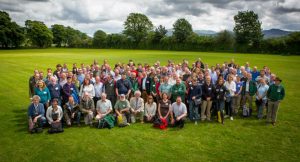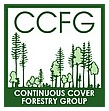This document was recently translated into English and provides a simple structured step-by-step approach to continuous cover management practices to support foresters and forest owners who wish to successfully adopt continous cover forestry in their forests. You can purchase copies of this booklet from Pro Silva Ireland.
Author Archive
Successful Underplanting by Gary Kerr and Jens Haufe
Further information about successful underplanting for continuous cover silviculture can be found on the Forest Research website.
More than 50 organisations, led by the Woodland Trust, are leading UK society in a call for a charter that will ensure that people and trees can stand stronger together in the future. This charter, strengthened by support from all corners of society, will provide guidelines and principles for policy, decision-makers, businesses, communities and individuals.
CCFG is pleased to be supporting a consultation, hosted by Sylva Foundation, that will enable woodland owners and custodians across the UK to help define the 2017 Charter for Trees, Woods and People.
This consultation is the only activity specifically aimed at ensuring the views of woodland owners or custodians are reflected in the Charter. More than two-thirds of woodlands are held in private hands, so it is vital that the voices of woodland owners/custodians are reflected in the charter.
The ANW Deutschland e.V. (Pro Silva Germany association, headed by Hans von der Goltz) started at the end of 2015 a project called “BioWild”, dealing with the disequilibrium between natural forest regeneration / forest biodiversity and ungulate populations in Germany. In close cooperation with the universities of Dresden (Prof. Michael Muller), Gottingen (Prof. Christian Ammer) and Munich (Prof. Thomas Knoke) 25,000 hectares of forest lands will be monitored within 5 pilot regions for the upcoming 6 years. Our key objective is to promote biodiverse, mixed, stable and resilient forests. Based on field observations the BioWild-Project memberswill demonstrate to the public, and to the participating forest owners and hunters in particular, which immediate and long term ecologic and economic effects their decisions have on silvicultural issues, biodiversity or hunting. For this purpose the project results will be processed as easily understandable demonstration sites in the pilot regions. Guiding principles for policy and decision support will also be formulated. If you want to get more information about the BioWild-Project, please go to www.biowildprojekt.de.
This report, produced by Arne Pommerening, Lucie Vitkova, Xin Zhao and Carlos Pallares Ramos, is now available here.
Pro Silva Ireland held a field visit in Knockrath Forest, County Wicklow. This was a particularly important event in terms of promoting Pro Silva outside of the Pro Silva network since Duncan Stuart and the EcoEye Team recorded some of the days discussions for the EcoEye TV programme which is a very popular TV programme in Ireland. In addition, Donal Magner, Forestry Editor for the Irish Farmers Journal wrote an article about the day which helps promote Pro Silva principles to a new audience.
Resilient woodlands – everybody’s talking about them but what should they be doing? A unique conference organised jointly by the Royal Forestry Society (RFS) and the Woodland Trust, is bringing together economists, conservationists, woodland managers and foresters to look at the question from all angles, including a presentation by Phillipe Morgan on the contribution of CCF to forest resilience.
Resilient Woodlands: meeting the challenges is open to all and includes a number of plenary sessions to encourage debate.
Drought damage to Sitka spruce in eastern Britain and disease impacts on pine, and larch more widely, suggest that total reliance on Sitka spruce monocultures for upland forestry may prove unwise. The project re-evaluates mixed-species upland plantations which combine Sitka spruce with alternative productive conifers such as Norway spruce, Douglas fir, western hemlock, grand fir and noble fir, and touches on other potential alternatives.
The outcomes suggest that this approach could offer significant benefits of resilience to novel pests and diseases and, to a lesser extent, climate change. There are also advantages in terms of silvicultural development and ecological sustainability. The full report can be viewed on the Scottish Forestry Trust website.
We are grateful to the Forestry Commission for funding the production of these web pages and the conference report. They include pdfs – and some MP4s – of speakers’ presentations, the Conference Report and recommendations, and information on the research poster exhibition which was displayed at the conference. See Conference Home Page
 |
CCFG National Conference 2014
|
Background And Theme
The goals of the conference were to:
- Present latest developments in CCF management systems, especially focusing on the potential of CCF to promote sustainability and resilience.
- Demonstrate examples of CCF in practice, under a range of management objectives.
- Identify future measures that could result in wider adoption of CCF in Britain including consideration of aspects relevant to research and policy.
The conference attracted 140 participants from across the British Isles and from North America. Presenters included leading researchers, policy-makers and practitioners. The programme comprised both plenary sessions and site visits to Wythop and Thirlemere Forests, with technical presentations taking place in the two woodlands. There was also an optional third day of site visits to the western Lakes.
Programme, Talks and Presentations
Menu of CCFG National Conference 2014 Content:
- 2014 Conference Information– the original proposal document which sets out the context and themes of the conference.
- Research Poster Display – posters of 8 research projects which were on display in the Conference premises, 4 of which were winners of a student poster award funded by the School of Geosciences, University of Edinburgh.
- 2014 Conference Resources – the outputs from the conference: pdfs of speaker presentations (some also in MP4 format); conference report; photographs.
Thanks
We are grateful to the Forestry Commission for providing funding for the conference report and these web pages, enabling presentations and discussion from the conference to be made available to a wider audience.
Thanks also to the Scottish Forestry Trust for their support for the conference, including funding our visiting Keynote Speaker, Klaus Puettmann, Professor of Silvicultural Alternatives, Oregon State University.
We would like to thank the Local Organising Committee and in particular Ted Wilson, who worked tirelessly to present an excellent programme and make the conference such a success, and the speakers, volunteers, delegates and many others who contributed in so many ways.
Our thanks too to all our partners and sponsors who supported the conference with both generous donations and/or in kind.


